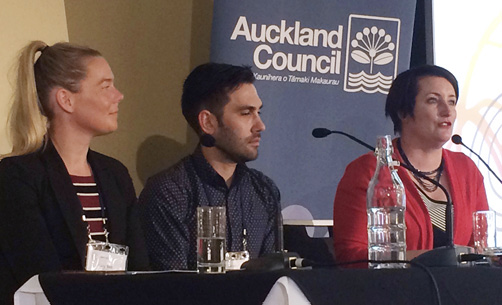
By Rebecca Riggs, Crisis Ready
The Emergency Media and Public Affairs (EMPA) 2016 New Zealand conference was held in Auckland 15–17 August and brought together emergency managers, researchers, editors and journalists and a wide range of communication practitioners including public information managers and social media, engagement and recovery communication specialists.
Bobby Newson, Kaihatu, Auckland Council welcomed us and reminded us of the spirits of the wind and fire and water that influence the work we do every day. Communication experts came together to share compelling stories of their experiences and the lessons they have learned.
Imogen Wall from the United Kingdom discussed her work with agencies including UNOCHA, Save the Children and ActionAid, in humanitarian emergencies such as those in Aceh and Haiti. She shared her insights into the vital importance of effective communication with survivors of disasters and the growing understanding of the value of affected people as producers of information and creators of communication platforms and tools.
Sarah Stuart-Black (Director CEDM New Zealand) shared a national perspective on the development of emergency communication and her passionate commitment to continued growth and change.

Mark Crosweller (Director-General Emergency Management Australia) asked us to consider the narrative of the work we do. Discussing mythologies from the Holy Grail to Star Wars, he inspired a shared awareness of the challenges and possibilities of the journeys we take, as we respond to disasters and work with the people who have been affected by them.
EMPA Fellow Bob Jensen (formerly FEMA and Department Homeland Security USA) outlined ways to engage and partner to create ‘whole community engagement’.
A half-day focus on achievements, innovations and breaking the mould in social media created enthusiastic dialogue, as Mia Garlick (Facebook Australia and NZ), Matthew Prior (formerly Waikato CDEM) and Lucy Bell, (Department of Environment, Land, Water and Planning, Australia) shared their considerable knowledge and discussed their different experiences and possible future directions.
A very well-received Masterclass in Emergency Communication Planning was held on the third day. It allowed delegates to examine and discuss the context of planning and the challenges they face and offered new perspectives, systems and tools.
EMPA exists to lead and support the continual evolution of effective communication and community engagement before, during and after emergencies by providing a network for all who practise and research in this sector. With the energy and open minds of the delegates and the commitment of the speakers to create real change, the EMPA New Zealand conference did just that.
The 2016 conference was sponsored by Auckland Council. EMPA’s next New Zealand Disaster Communications Conference will be 14-16 August 2017.
The 2017 EMPA conference in Australia is sponsored by Emergency Management Australia and will be held in Sydney from 4-6 June 2017.
For more information: www.empa.org.au.